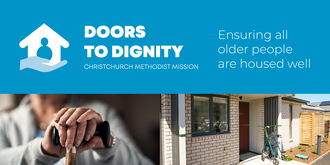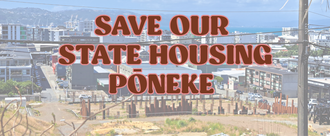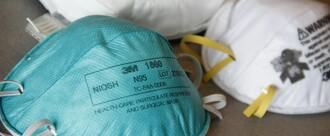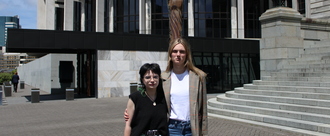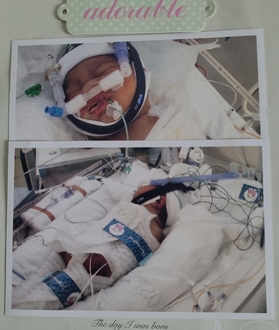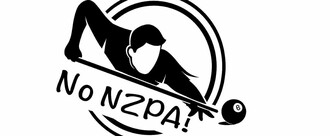-
Increase and Target Investment in Social and Affordable Housing for Older PeopleOver the last couple of years, the Christchurch Methodist Mission has become increasingly aware of the number of older people in housing distress. We are seeing this in the growing waiting list for our affordable and social housing at Wesley Village, and in the number of older people requiring emergency housing in both Christchurch and Blenheim. Our homelessness outreach team are also observing an increasing number of older people sleeping rough. By 2050, nearly 400,000 retirees are expected to be renting, with many relying on NZ Super as their sole or primary source of income. However, NZ Super was not designed to sustain people in the private rental market. Already, many older renters are spending more than half their Super on rent alone. Older people have a fundamental right to affordable, accessible, and healthy housing. Yet, figures from the Ministry of Housing and Urban Development show that New Zealand is not building enough homes to meet this growing demand. Without urgent Government investment in older persons’ housing, this situation will continue to deteriorate. We need homes to be built that are: • Affordable • Accessible • Warm and healthy • Designed to foster cultural connection • Embedded in local communities. We know the difference that living in such a home makes to physical and mental wellbeing. Health costs are reduced, and people can stay in their homes longer before entering care. Thus, quality, age-friendly homes are a good investment from both a social and economic viewpoint. The current challenge of older persons’ housing is urgent. Without meaningful intervention, we are headed towards a full-blown crisis. Now is the time to act with foresight, compassion, and courage. Please click the link below to sign our petition and share it within your networks: https://petitions.parliament.nz/7e886066-455b-4ab6-be96-08ddec0a4a41?lang=en1 of 100 SignaturesCreated by Doors to Dignity Christchurch Methodist Mission

-
Save State Housing in Pōneke Wellington CityWellington City should be a place where everyone has a stable, healthy and suitable home whatever their income. A place where children can grow up together and where people can put down roots near the people and places they need to thrive. Housing affects every part of our lives. The stress of short tenancies, week-to-week emergency housing grants, and the looming threat of rental increases has a major impact on people’s wellbeing and working lives. Constant moving to find housing robs whānau of the opportunity to connect with their communities. State housing has and can provide stable, affordable homes for people on lower incomes - from the first ever state house built in Miramar, to the new state housing built in Pukeahu Mt Cook. We know from our own history and from overseas, that when governments play a bigger role in building and providing decent and suitable housing, we lay the foundation for thriving communities. Yet, despite the benefits, successive governments have not built enough homes to meet the growing need in our communities. In Pōneke Wellington: • There are 621 households on the housing register for Wellington City, 585 are considered Priority A (September 2025).[1] • There are 2,766 people in severe housing deprivation in Wellington City which forces people into unsafe and unstable living arrangements.[2] • State housing provider Kāinga Ora is selling sites making this land unavailable for future public housing[3] • And, the Government has cancelled projects and paused other projects, including the 300+ units at Arlington St, Mt Cook[4] There are 400 state homes which have been cancelled in Wellington City[5], including: • Evans Bay Pde, Kilbirnie, Wellington with 30 homes that were going to be Universal Design cancelled • Ngatiapa St, Tukanae St & Rahui St, Strathmore Park, Wellington with 41 homes cancelled • Nuku St, Strathmore Park, Wellington with 28 homes cancelled • Wayside, Miramar, Wellington with 1 home cancelled • Arlington St, Mt Cook with 300 homes, foundations in the ground is pending a decision Only 3 projects continue: • Miller Place, Lyall Bay with 28 homes is proceeding and due for completion in 2027 • Kekerenga St with 3 homes is due for completion in 2026 • Coromandel St, Newtown with 11 homes is due for completion 2026 While these essential public housing developments have been cancelled, the need for decent and secure housing has increased. Downtown Community Ministry recorded a 24% increase in rough sleeping for the first 3 months of 2025 compared to the same time in 2024.[6] Wellington is fortunate that the City Council is involved in housing through Te Toi Mahana, a Community Housing Provider (with 1764 homes) and through Te Kainga housing (370 homes), and with NGO community providers like Dwell (100 tenancies) and Wellington City Mission (70+ transitional units, and rest home and residential care). Despite this, it is still not enough to meet demand and these providers have limited access to funding to build more. The Government has the obligation and the ability to fund housing to meet the needs of all. We need the Government to build more public housing, but to also make the housing they build accessible and suitable for our communities. This means supporting different types of public housing, including using the Housing First approach, which is a proven best practice for supporting whānau who have experienced long-term homelessness and have other challenges, such as mental health and addication. It means housing first, and then wrap-around services for whānau after.[7] Te Ō in Mt Cook is an example of how this is working for Wellington City public housing, through a Single Site Supported Housing model. If we leave house building to the market, we’ll keep building homes that are not accessible or suitable for our communities - with steps, narrow doorways, and bathrooms that don’t work for many. Through publically-funded housing we can support designs that work for your niece with cerebral palsy, your friend recovering from a stroke, your pregnant sister, your colleague with a broken leg, or your granddad who now uses a walking frame. Currently, only 4% of our public housing has universal design that are suitable for a wide variety of people, while the housing register has around 19% of people in households who need accessible housing. Kāinga Ora were making commitments to building more accessible homes including the 30 universally designed homes on Evans Bay Pde that have now been cancelled. We ask the House of Representatives and Minister of Housing retain existing housing sites, keep building the promised state houses and to increase public builds at a scale that will ensure stable, permanently affordable and accessible housing for everyone who needs it. References: 1. Housing Register, MSD September 2025 2. Aotearoa Data Explorer, Severe Housing Deprivation Census 2023 Stats NZ 3. Property Sales, Kāinga Ora, 2026 4. Kāinga Ora slashes social housing in Wellington. The Post, 19 June 2025 5. Data from a spreadsheet available in this Information sheet: Project assessments and write downs, Kāinga Ora, June 2025 6. Homelessness Insights Report. Ministry of Housing and Urban Development. June 2025 7. Read more about how Housing First works with public housing in Finland here and in Aotearoa here. Pōneke Public Housing Futures is a group of everyday people in Wellington who believe secure, suitable housing is a fundamental right that must be available to everyone with a need. We are concerned that not enough public housing is being built to meet the needs of all in Wellington. Stable affordable housing is the first step needed for everyone to thrive. Currently in New Zealand only 4% of all housing is state or community housing, this is significantly lower than many other countries. We want to see a large increase so that everyone who wants a public or state house can be housed without spending months on a waiting list.120 of 200 SignaturesCreated by Pōneke Public Housing Futures
-
Golden Triangle by Train: Te Huia to TaurangaOver half of New Zealand’s population lives in the Golden Triangle, and it is one of the fastest-growing parts of the country — it makes sense to have a modern, safe and efficient train service between Auckland, Waikato and the Bay of Plenty. Te Huia is already showing how passenger rail can help people get to work, study, healthcare, and visit whānau without relying on long, expensive, and often dangerous road trips. Investing in passenger rail eases congestion, improves road safety, reduces emissions and supports regional growth and tourism. With major rail infrastructure already in place and the City Rail Link opening in 2026, now is the time to build on Te Huia’s foundations — not walk away from them.3,505 of 4,000 SignaturesCreated by The Future is Rail
-
For a Hutt Valley where everyone has a homeA stable, decent home is important for a good life. It supports our safety, our health, and ability to participate in society. It helps us build community connections through our neighbours, local schools, sports, and cultural clubs. It allows us to put down roots and have a sense of belonging. But successive governments have not done enough to make sure everyone has decent and suitable housing. They have prioritised legislation and policy that helps property investors make profits, while reducing Government’s income. They have underfunded the construction of state housing, meaning there is not enough to meet the need. This has forced many people, including people in the Hutt Valley, into severe housing need, living in unsafe, unhealthy, and insecure living situations. We have people in our community experiencing hardship because of the price of rental properties, people living in substandard and overcrowded houses or in garages, cars, or parks. The emotional and financial stress due to housing insecurity are added pressures for families and individuals who are among the most vulnerable in our community. To get onto the public housing register (waitlist), you must be in severe housing need. We have hundreds of whānau/households on the public housing waitlist for the Hutt Valley [1]. But it is clear that there is not enough housing available for them. People are often experiencing long times on the waitlist [2]. There are too few Kāinga Ora homes in the pipeline for the Hutt Valley [3], while existing Kāinga Ora homes are being put up for sale [4] and some planned constructions have been cancelled [5]. And under the Government’s Housing Investment Plan [6], no money has been earmarked for further new Kāinga Ora homes in the area. The Government has indicated that it is looking to the private market to solve the problem of unaffordable housing and housing insecurity [7]. This is unlikely to help the people on the public housing waitlist who need housing now, or to solve the ongoing issue of severe housing deprivation in our community [8]. Together we can change this. If we make state housing a priority, we can ensure that no one in our community has to experience housing deprivation and that everyone has stable, decent, appropriate housing where they can build a good life for themselves and their families. Let’s tell our local politicians that Hutt Valley people see this as an important issue for the 2026 General Election. Let’s tell our politicians that we want a commitment from them to give Kāinga Ora the resources and the direction that will enable it to get people off the waitlist and into state housing, and meet community need for housing in an ongoing way. You can send this message to our local politicians by signing the petition. Find out more about the nationwide Public Housing Futures Campaign at: www.publichousingfutures.com Contact the Hutt Valley Public Housing Futures group at: [email protected] References: [1] 489 households as at November 2025 - 371 for Lower Hutt, 118 for Upper Hutt. Source: Ministry of Housing and Urban Development [2] The average national wait time for people on the public housing register, from their application being accepted to that tenancy being activated was 165 days (5 months) as at October 2025. Source: Housing and Urban Development [3] 218 homes in the pipeline as at April 2025 - houses are either in construction or proceeding to a detailed business case. Source: Kainga Ora [4] 56 homes have been put up for sale as at September 2025 - 55 in Lower Hutt, 1 in Upper Hutt. Source: Kainga Ora [5] 58 houses cancelled as at June 2025. Source: Kāinga Ora 'Kāinga Ora takes next step in financial reset', 19 June 2025 [6] Housing Investment Plan 2025. [7] Kainga Ora Strategy 2025 – 2035, Housing minister Chris Bishop reveals new Kāinga Ora strategy | 4 February 2025 | RNZ, Housing reform in NSW and New Zealand, Chris Minns, Chris Bishop, & Peter Tulip [8] RNZ, ‘Government wants to 'flood the market' to make houses more affordable - how will that work?’, 5 July 2024. The Conversation, The billions spent on NZ’s accommodation supplement is failing to make rent affordable – so what will?, 24 April 2025. University of Auckland, The flaws in NZ's accommodation supplement, 9 May 2024.366 of 400 SignaturesCreated by Public Housing Futures Hutt Valley
-
Stop early labelling in primary school reports (2026)From 2026, primary schools will report children’s learning using national labels: Emerging · Developing · Consolidating · Proficient · Exceeding For children aged 5–7, this approach is developmentally inappropriate. Learning at this age develops unevenly, at different rates for different children, and early labels often reflect developmental readiness and support needs rather than true understanding or potential. This matters because: • Early learning is non-linear Children aged 4–7 show wide, normal variation in attention, language, memory, and self-regulation. Progress does not happen in neat stages. • The labels describe support levels, not learning ability Terms like Emerging and Developing explicitly reference the amount of support a child needs, which risks equating support needs with lower ability. • Children within the normal developmental range are labelled Many children will sit in Developing or Consolidating simply because their learning is still forming, not because they are behind. • “Developing” and “Consolidating” are easily read as deficit For whānau, these labels are easily interpreted as “not meeting expectations”, even when development is typical. • Neurodivergent children are particularly disadvantaged These children may understand concepts but struggle to demonstrate learning in standardised ways due to differences in communication, processing speed, regulation, or anxiety. • Wellbeing and confidence are affected Early labelling can undermine confidence, increase stress, and discourage children from taking learning risks. • This approach has caused harm before New Zealand previously moved away from national benchmarking systems after evidence showed they narrowed learning and negatively affected wellbeing. Early learning should focus on growth, relationships, and support, not categorising children on a national scale.542 of 600 SignaturesCreated by Kate Muir
-
A Call for Safe Air and Masking in Healthcare SettingsWe, the general public, and the undersigned clinicians, scientists, and health professionals, call for the urgent reinstatement of basic airborne-infection-control measures—clean indoor air and appropriate airborne respiratory protection —in all healthcare settings across Aotearoa, New Zealand. These are the simplest and most effective tools to prevent avoidable illness, disability, and death among both patients and staff. Since the withdrawal of SARS-CoV-2 COVID-19 mitigations, hospitals and clinics have faced relentless outbreaks of respiratory viruses. Emergency departments are routinely operating beyond safe capacity, and senior doctors have compared recent winters to “mass-casualty situations.” [1] Aotearoa New Zealand’s “vax-and-relax” strategy has failed to protect our people. 1 in 5 children infected with COVID develop long-term symptoms. [2] Nurses and doctors have among the highest global rates of Long COVID [3], and ongoing staff illness contributes to understaffing, treatment delays, and preventable deaths. There are currently no adequate systems in place to support long COVID and post-viral disease in New Zealand, and instead, patients are met with medical gaslighting and a lack of medical and social support. [4] COVID-19 causes vascular damage and damage to every organ in the body, including the brain and heart, due to its ability to target endothelial tissues. [5] It wreaks havoc on the immune system, leading to an impaired response to future immune assaults. This has led to the rise of more severe responses to other illnesses, worsening of current conditions, outbreaks of recurrent infections (including fungal and bacterial), thus increasing pressure on emergency medical services. [6] Excuses such as "immunity debt” are not scientifically substantiated; in fact, all viruses damage rather than enhance the immune system, for example, both SARS-CoV-2 and influenza at least triple the risk of heart attacks. [7] The effects of viruses have been missed, overlooked, and minimised, leading to a culture of indifference and ignorance surrounding the impacts of catching regular viruses, including in healthcare settings and a reluctance to change following the ever-growing body of research that shows viruses can cause more significant harm than first thought. We strongly believe that every person in Aotearoa New Zealand has a right to access safe healthcare without the risk of catching a deadly or disabling virus. This falls under our legal right to health, including access to timely and appropriate healthcare. Additionally, every healthcare worker has the right to a safe workplace and working conditions that support them to stay home when sick. [8] Treating airborne infection as a matter of “personal responsibility” violates these rights and undermines public trust. Critically, for the best prevention possible, fit-tested respirator masks (N95/FFP2 and N100/FFP3) must become the standard in all health care settings. Surgical masks are proven not to be effective against aerosolised respiratory viruses. [9] According to the British Occupational Hygiene Society (BOHS), it is a breach of health and safety standards to claim that surgical masks protect against inhaled hazards. Like sterile surgical gloves or seatbelts, respirators and ventilation are proven life-saving norms —not restrictions on freedom, but tools that enable freedom through safety. We respectfully urge the Ministry of Health Manatū Hauora, Te Whatu Ora Health New Zealand and the government and other regulatory bodies in charge of these regulations to implement the following evidence-based protections: 1. Use proven mitigations to prevent the spread of respiratory and other aerosol viruses at all times. 2. The return of mandatory protections for aerosolised viruses such as SARS-CoV-2 at all times, not just during a known ward outbreak, in all clinical spaces. Including visitors, staff and patients (where medically possible). 3. Respirators, i.e N95's or equivalent, not surgical masks, are to be used as the default mask practice (this is because surgical masks are not PPE for respiratory viruses.) 4. Paid sick leave and safer staffing levels so infected staff can stay home until they are no longer infectious and are well enough to safely perform their duties. 5. Return to regular COVID testing in emergency departments and wards. Including the numbers of patients and staff catching viruses like COVID-19 in hospitals, and nationally, the number of Long Covid cases and associated pathologies. 6. Mechanical ventilation and HEPA filtration in all patient-care spaces, operated at all times rather than reactively and ensure safe CO2 levels in each space. 7. Education on the importance of masking, different types of masks, their effectiveness and the proven damaging effects of COVID-19 infections. This information needs to be shared regularly with the public. 8. Increase funding, clinical care and community support for Long Covid and associated pathologies such as ME/CFS, POTS, Cognitive issues and more. (Please read the full letter for all details and recommendations) Health is a collective responsibility. Allowing uncontrolled viral spread threatens not only individual lives but the sustainability of the entire health system. By restoring clean-air standards and airborne viral protection, Aotearoa can once again lead the world in compassionate, science-based public health. A final note to anyone in healthcare, you do not need to wait for another mandate to start masking with the best tools we have to protect yourself and patients and the community today. Thank you! From Mask Up NZ in association with Aotearoa Covid Action. This petition is dedicated to Alice Wong, Leslie Lee III, and anyone who has lost their lives or had their health impacted by viral spread in a health care setting. (contact: [email protected]) References [1] https://www.stuff.co.nz/nz-news/360816342/ [2] https://doi.org/10.1111/jpc.70104 [3] https://doi.org/10.1093/occmed/kqae113 [4] https://www.rnz.co.nz/news/national/577991/ [5] https://doi.org/10.7759/cureus.9540 [6] https://whn.global/scientific/the-long-term-immune-effects-of-covid/ [7] https://doi.org/10.1161/JAHA.125.042670 [8] https://www.legislation.govt.nz/act/public/2015/0070/latest/DLM5976660.html [9] https://www.thelancet.com/journals/ebiom/article/PIIS2352-3964(24)00192-0/fulltext1,392 of 2,000 SignaturesCreated by Mask Up NZ
-
Reverse the decision to deny transgender and takatāpui young people access to puberty blockersDear Minister Simeon Brown We write to you as transgender and takatāpui young people of Aotearoa New Zealand to ask you to reconsider your decision to ban the use of puberty blockers (gonadotropin-releasing hormone analogues) by transgender young people. To be transgender or takatāpui is a taonga. To deny our young people access to life-saving medication on the basis of an imported culture war is cruel and abhorrent. Trans young people are some of our most at-risk youth. Not because of who they are, but because of how our society treats them for something they have no control over. Denying our rangatahi an effective medication that gives them the time to discover who they are is needlessly cruel. According to Counting Ourselves 2022, 77% of trans people experience high or very high psychological distress, compared to just 12% of the general population. When compared to the fact that 95% of trans youth have a positive impact on their mental health from the use of puberty blockers, how could such a vital medical intervention be ignored? This decision is an infringement on human rights and medical autonomy, as stated by Te Kāhui Tika Tangata The Human Rights Commission. Denying access to essential healthcare for trans and takatāpui youth is going to cause unnecessary harm and distress to not just young people but to their whanau as well. The fact that it is only our gender diverse youth that are denied this care, and not the general population, is clear discrimination designed to target our most vulnerable. We urge you to reconsider your decision and put our young people’s health ahead of politics. Sincerely Lauren Craig & Ngahuru Autumn Brown9,374 of 10,000 SignaturesCreated by Lauren Craig & Ngahuru Brown
-
ACC SYSTEMIC MALADMINISTRATION & MANDATORY TIMEFRAME REFORMSI care deeply about this issue because I have seen firsthand how ACC delays, lost documents, and repeated administrative failures cause real harm to ordinary New Zealanders. The image above is the beginning of our story — a child fighting for life while a system meant to protect us repeatedly failed. Our petition speaks not only for her, but for every whānau still trying to survive the consequences of ACC’s neglect. When decisions take months or years, families are left without income, without treatment, and without answers. These are not isolated mistakes — they are systemic failures affecting people from every region and every background. No New Zealander should suffer financially or emotionally because an agency did not meet its basic responsibilities. Timely decisions and clear accountability are not luxuries; they are the foundation of a fair and trustworthy public system. This reform is about ensuring that every person in Aotearoa is treated with dignity, urgency, and justice.146 of 200 SignaturesCreated by Belinda Wharehinga

-
Pause Charter-School Approvals Until Transparency & Safety Are GuaranteedOur children deserve access to safe and integrity-driven education. Right now, companies like Crimson are pushing charter schools through with almost no oversight, while making money off private tutoring. There’s already been abuse in one of their programs - a tutor with past convictions actually harmed children - and that shows the system isn’t keeping kids safe. At the same time, schools that are doing things right, like The Liger Leadership Academy, are being denied approvals. And Kelston Boys had its governance documents redacted in a way that makes it impossible to verify what actually happened. It’s not just bureaucracy - it’s about who gets to shape education for every kid in NZ. If Parliament doesn’t pause and review this properly, we’re basically giving public money and control to private interests with no accountability. That’s why I’m pushing this petition: it’s about safety, fairness, and protecting public education for everyone.2,593 of 3,000 SignaturesCreated by Brie Anglesey
-
Save our State Housing in Ōtautahi/ Reverse the cutsEveryone in Aotearoa deserves to be housed; this is a basic human right. People should have agency over their housing, and it should be designed to be fully accessible. This would strengthen communities in Ōtautahi, as people will be able to put down roots and build connection. It will support our whānau to thrive, and provide the stability needed for a thriving city where everyone can live a decent life. Successive governments have failed to ensure everyone in our community has suitable housing or any housing at all. Now, the National-led Government has cancelled Kāinga Ora developments, plan to sell off state housing and make it less available to our communities. This will lead to more people living in unaffordable and unsuitable private rentals, in their cars and on the streets. It also means that state-owned land will be privatised that should otherwise be returned to hapū and iwi for Māori housing solutions. In Ōtautahi we have: - 1500+ households on the Housing Register - 6753+ people experiencing Severe Housing Deprivation (homelessness) *Census 2023 (grown since data was collected) And still, this National-led government has decided to cancel 25 developments, 373 homes that were in the pipeline, that would've housed whānau in need in Ōtautahi. They are also selling state homes to the private market The Government says it is supporting Community Housing Providers (CHPs) to play a bigger role in social housing provision, yet it expects to fund only 70 new CHP homes in Ōtautahi by 2027, and only four have been delivered so far. We know from our own history and from overseas research, that when governments play a bigger role in providing decent and suitable housing, we as a country lay the foundation for thriving communities. We have built state housing at scale as a solution before, and we can do it again. The people of Ōtautahi who are living without shelter or safe and affordable homes need our community to stand in solidarity to save our state housing. We need all 373 Kaianga Ora houses to be built. We are calling on Minister for Housing, Chris Bishop; Minister for Māori Development, Tama Potaka; MP for Ilam, Hamish Campbell; MP for Christchurch Central, Duncan Webb; MP for Christchurch East, Reuben Davidson; MP for Banks Peninsula, Vanessa Weenink; MP for Wigram, Megan Woods to advocate for the people of our communities to ensure that everyone has a decent, stable and accessible home, and to stop the sell off.39 of 100 SignaturesCreated by Save Our State Housing Ōtautahi
-
Deliver on your promise: A new single Redress Agency for survivors of abuse in care!We all want Aotearoa New Zealand to be a place where everyone can thrive. Certainly a place where survivors of abuse in State Care and in the Care of Faith-based Institutions can thrive. We know that what has happened to the estimated 250,000 vulnerable adults, children, and babies is a “national disgrace” according to Judge Coral Shaw, former Chair of the Abuse in Care Royal Commision of Inquiry. The Abuse in Care Royal Commission of Inquiry’s Final Report, Whanaketia: Through pain and trauma, from darkness to light, was very clear: “"As an immediate priority, the government and faith-based institutions should implement the 95 recommendations in the Inquiry’s interim report on redress, He Purapura Ora, he Māra Tipu: From Redress to Puretumu Torowhānui (2021), together with the recommendations of the design group, subject to any further recommendations made in this report." [1]” The Interim Report, He Purapura Ora, he Māra Tipu from Redress to Puretumu Torowhānui, has 95 Holistic Recommendations to improve the current redress systems (Ministry of Social Development, Ministry of Health, Oranga Tamariki - Ministry for Children and Ministry of Education) for survivors of abuse in care [2]. Summary of the redress recommendations are: • expansion of oranga, or wellbeing, services and support services for survivors and their whānau; • increased financial payments for survivors; • training for those working with survivors; • enactment of a right to be free from abuse in care, as well as a duty to protect this right; • an exception to accident compensation legislation; • improvements to the handling of survivors’ requests for records, including as few redactions of survivors’ records as possible; and, • a review of record-creation and record-keeping practices. On the 12th of November 2024, the Prime Minister, RT Hon. Christopher Luxon, finally and formally apologized to survivors of abuse in State and Faith-based care. He apologized to survivors for the horrific and harrowing abuse they have experienced while in care, he apologized to their family and whānau and he outlined some steps that the Government will take to address the Final Report of the Inquiry. He said: “"But I want to assure you it is our intention to have a new single redress system operating next year." [3]” On the 9th of May 2025, the Lead Coordination Minister, Hon. Erica Stanford announced changes to the redress system for abuse in care survivors. She announced: • Increasing the average redress payments for new claims from $19,180 to $30,000; • Providing for higher payments for the survivors who experienced the most egregious abuse; • Providing “top up” payments of 50% to survivors who have already settled claims to ensure consistency with increased payments for new claims; • Introducing a common payments framework so that survivors receive the same financial redress for similar experiences of abuse, regardless of where in state care that abuse occurred; • Increase system capacity to process claims from 1,350 to 2,150 per year from 2027 to reduce wait times for current claimants; • Implementing a seamless service so that survivors with claims with multiple agencies have those claims managed by one point of contact; • Introducing a single-entry point for survivors wanting to register new claims; • Introducing an independent review for people who are unhappy with their redress offer; and • Funding for redress agencies to provide survivors with access to supports and services. She said: ““I acknowledge that a key recommendation of both the Royal Commission and the Redress Design Group was for a new independent redress entity. “The Government was faced with a difficult choice: do we spend more time and money on setting up a new scheme, or do we provide more to survivors now through the current redress process? “For Budget 25 we have prioritised improving the current system as quickly as possible for survivors and investing in changes that have a direct impact for them." [4]” To date, the Government has only implemented 28 of the 135 recommendations from the Abuse in Care Inquiry that relate to the Government. [6] These reports from the inquiry shed light on the harrowing and horrific experiences that survivors faced while in the care of the state and faith-based institutions, and emphasise the profound impact that abuse has had on survivors’ lives. Now is the time for action: for people across Aotearoa to come together and be part of the process that ensures that survivors in Aotearoa can thrive. By signing this petition, you are standing up for the rights of survivors and sending a clear message to the Crown: They have a duty of care to survivors, and a duty to implement a new single redress agency and implement all of the recommendations from the Abuse in Care Royal Commission of Inquiry. Together, let's ensure that survivors are supported. Join us in this crucial fight by signing the petition today and spreading the word to your friends, family, and community. Together, we can make a difference and safeguard the future of care and help survivors of abuse in State and Faith-based Care to thrive. _________ References: 1 - https://www.abuseincare.org.nz/reports/whanaketia 2 - https://www.abuseincare.org.nz/reports/from-redress-to-puretumu/ 3 - https://www.1news.co.nz/2024/11/12/full-text-of-prime-ministers-apology-for-abuse-in-care/ 4 - https://www.beehive.govt.nz/release/budget-2025-invests-care-system-and-improving-redress-survivors-abuse-state-care 5 - https://www.abuseinquiryresponse.govt.nz/assets/Uploads/Proactive-release/Putahi-te-mauri-he-wai-ora-e-Redress-design-proposals-1.pdf 6 - https://www.abuseinquiryresponse.govt.nz/about-us/official-information/information-releases/cabinet-papers-and-minutes/proactive-release-of-decisions-about-the-governments-response1,188 of 2,000 SignaturesCreated by Ihorangi Reweti Peters

-
Aotearoa's Pool Players Deserve Better: Remove NZPACue sports in Aotearoa should be games of skill, fairness, and community. When a governing body fails to protect players’ rights, ensure due process, and foster a positive culture, the whole sport suffers. Our players and these sports deserve leadership that upholds integrity, fairness, respect; leadership that wants the best for the sport and celebrates competition among players The NZPA has consistently mishandled disputes, disciplinary matters, and player relationships. Previous board members that have left due to complaints continue to have an unreasonable presence and strong influence over the NZPA. Players are subjected to unfair suspensions, bans, accusations without evidence, and inconsistent disciplinary processes. Those in positions of power have refused to recognise conflict and have behaved unethically and contrary to the rules they are obliged by. When players ask them to behave ethically and in accordance with the rules, they are targeted and removed from the association or its events. This has harmed the wellbeing of players, undermined trust, impacted the quality and progress of players and damaged the reputation of the sport nationally and internationally. Complaints include: • Suspensions and bans handed down without transparent processes or clear evidence. • Accusations of bullying, intimidation, and unfair treatment. • Lack of trust and confidence from top players and clubs. • A culture of fear, division, and exclusion rather than support and growth. • There are complaints against NZPA with the appropriate authorities Instead of protecting and promoting the sport, the current leadership has damaged its credibility. Many excellent players refuse to be part of NZPA; many venues will not host NZPA events and upcoming players are warned against them. This is destroying cue sports within and for our country. By signing, you are sending a clear message that players, clubs, and communities will no longer accept poor governance and unfair treatment. A strong public voice makes it harder for decision-makers to ignore the issues. Your support will help push for change, restore fairness, and give cue sports in Aotearoa, New Zealand the chance to thrive under leadership that players can trust. Together, we can protect the integrity of the game and the mana of those who play it. Te Karere Denied the opportunity to represent her country NZ Herald Denise Wilkinson's suspension NZ Herald Turmoil in NZ's pool community501 of 600 Signatures

